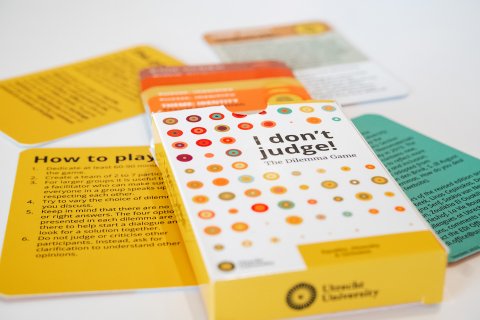The Dilemma Game

How would you react to someone making an offensive remark about your country of origin? What would you do when someone disrespects your privacy? What would you say when your manager repeatedly treats your colleague with patronising behaviour? These situations may very well sound familiar to you, either from your professional or your private life. To make sure we treat each other with respect and dignity, it is important to be open about issues and to create a safe space for a constructive dialogue. The Dilemma Game can help with that.
I don’t judge!
Consisting of a range of real-life dilemmas, this game provides a great opportunity to put yourself in the shoes of others, reflect on different actions and to better understand different perspectives and viewpoints. The game can also be a good way to exchange opinions or experiences and can act as a step towards finding a common ground on certain principles.
Example from the Dilemma Game
A new colleague named Quinn has joined your team. Quinn has stated that they are non-binary and has asked that everyone refer to them with they/them (in Dutch “die/diens”) pronouns. During meetings without Quinn, your colleagues, including the managers, refer to Quinn as “she” because according to your colleagues, “using they/them is too difficult”. What do you do?
- Tell Quinn so they know about this and can address it.
- Correct your colleagues every time they use the wrong pronoun.
- Nothing. I do not want to offend my managers or cause difficulties.
- Try to help your colleagues learn how to use they/them pronouns and discuss what they find difficult about it.
Goal of the game
The goal of the game is to spark fruitful conversations among participants about issues related to diversity and inclusion, and to help them better understand different perspectives and viewpoints. It is a conversation starter that encourages us to consider and explain (and possibly reconsider) alternative courses of action. The important thing is not to judge or criticize each other. Instead, ask for clarification to understand other opinions, think of the course of action you would choose, explain why this is the case and discuss it with others in a respectful way.
Who is the game for?
This game is especially relevant for employees in the (higher) education sector. Some of the dilemmas are also generic so they can easily be used within other sectors. Play the game during a team outing, team building, theme meeting, workshop, lecture or as part of a training course (e.g. recruitment & selection, (un)conscious bias).
How to play?
Create a team of 2 to 7 participants – neither too small nor too large for deeper conversations. It is advisable to appoint one person as facilitator. The facilitator will ensure that everyone gets to speak, that discussion ensues and that everyone treats each other with respect. Depending on the number of dilemmas you would like to discuss, dedicate at least 60-90 minutes to the game. This will give you enough time to introduce the game, discuss several dilemmas and round off the discussion.
More information
For questions, comments or feedback, please contact the Equality, Diversity & Inclusion (EDI) Office of Utrecht University at edi.office@uu.nl.
About the game
This second revised version is based on the dilemma game themed around diversity and inclusion and developed by the members of the Nanophotonics Section from the Debye Institute for Nanomaterials Science of Utrecht University in 2019. This new version of the game contains new, fully reviewed dilemmas to reflect more dimensions of diversity and inclusion. Some dilemmas were adapted from Agterberg R. and Van den Brink, S. (8 August 2018) ‘Diversity dilemmas. How do you deal with them?’, DUB (website). The contributors of this revised edition are: Caspar Bok, Linas Cepinskas, Frederike Groothoff, Kim van Hees, Hai Le, Merel Nissen, Zoulikha El Ouakili-Saadi, Lina Senen, Gary Sheikkariem, Hylko Tas en trainers van het departement Taal, Literatuur, Communicatie van de faculteit Geesteswetenschappen en andere collega’s aan de Universiteit Utrecht.

